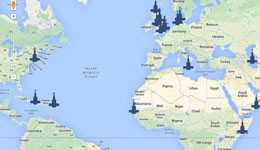South Wales-based Corilla Marine has made it possible for the Sultanate of Oman to deploy a fish aggregating device (FAD) in the Indian Ocean.
A FAD is a man-made object used to attract ocean-going pelagic fish – species which inhabit the sea away from the bottom or the shore, such as marlin and tuna. More than 300 species of fish are drawn closer to the ocean surface by FADs – flotation mats attached to tethered buoys – enabling line and pole fishing for tuna rather than using nets. An international demand for dolphin-safe tuna fishing has been the driving force behind the development of the devices.
Corilla Marine designed and manufactured the unsinkable EM2400 buoys for BAE Systems, and supplied them through MacAlister Elliott & Partners Ltd., specifically for use as FADs.
The buoys were deployed in the Indian Ocean with the correct weight of moorings below, as specified by Corilla. The float collars of the buoys are filled with marine grade closed-cell polyurethane foam which has hydrophobic properties so that it does not take in water when submerged. This ensures that, even if the hull of the buoy is breached by a collision, the buoy will not sink.
Oceans where FADs are used can be more than 700m deep. As well as attracting fish, FADs can also be used if waters become polluted to move fish to safety.
Corilla Marine is part of the Corilla Group which was formed in 2009 following the acquisition of a number of specialist manufacturing businesses. Today, Corilla’s innovative, rotationally moulded plastic buoys have made their steel predecessors obsolete – their modular design ensures a durable, lightweight and rust-free alternative. Corilla’s buoys can remain at sea far longer than their steel counterparts, making them operationally superior.
Corilla’s products are not only used extensively in the UK- with customers including the Ministry of Defence and the Royal Navy – and throughout Europe, but as far afield as South Africa, Somalia, Argentina, the USA, the Republic of China, the Middle East, in the Caspian sea, along the River Gambia, in the Caribbean, and now in the Indian Ocean.

 Where are our buoys?
Where are our buoys?